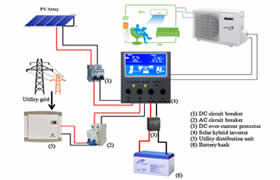Integrated system efficiency in reducing redundancy and promoting residential renewable energy in countries without net-metering: A case study of a SHS in Ghana
One of the key factors affecting progress of renewable energy (RE) in the residential sector in Africa is the unavailability of net-metering systems in many of its member-state countries. Huge battery storage would have to be put in place by individual households owning solar home systems (SHS) to store energy for early morning and night-time use, making the systems not cost-competitive. In this study, a new concept based on “integrated system efficiency (ISE)” has been developed to maximize direct use of electricity from SHS without net-metering. In a case study, real-time power consumption and solar PV electricity generation were monitored for an installed SHS in Ghana. The result showed that, in the absence of net-metering system, sustainable hybrid SHS can be realized if high consumption electrical loads comprising refrigeration systems, water pumping, and washing machines are shifted to daytime use, using ISE. The significant contribution of this study is that, for SHS without net-metering, a new performance parameter called “solar system redundancy factor” is identified as more appropriate indicator for measuring the actual usage of the PV electricity generation. Using the ISE concept developed in this study, the redundancy factor was minimized from 63.2% to 39.8% for the SHS.
https://www.sciencedirect.com/science/article/pii/S0960148120304316
